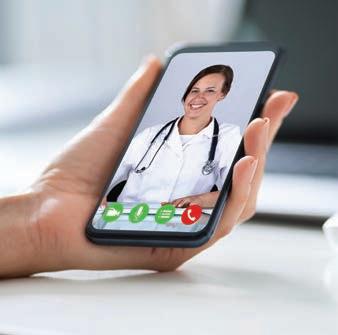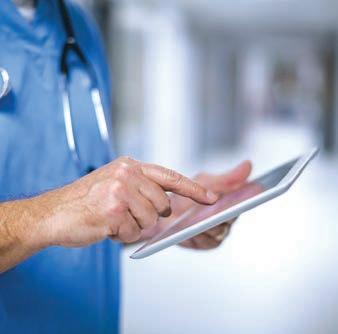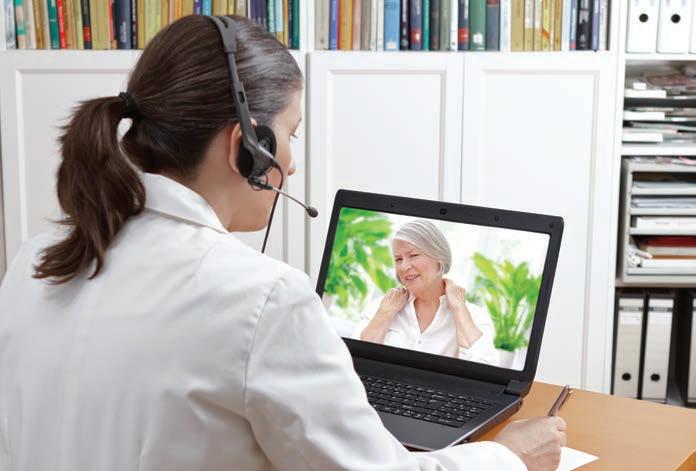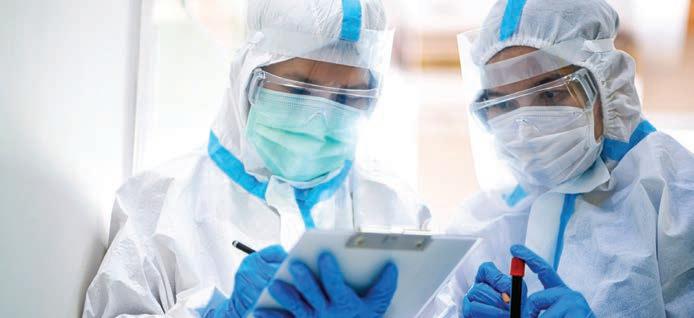
7 minute read
Telehealth on The Rise
digital health are becoming essential tools of healthcare delivery.” Many healthcare providers are finding that telemedicine is a great tool to supplement in-person visits and as a means to check in with patients and track their progress. For certain situations, in-person visits are not needed and a virtual appointment saves time for the patient and doctor. More healthcare providers have been receptive to using telemedicine as its benefits are becoming more apparent. “There had been hesitancy in the past, however it is becoming quite popular with both physicians and patients alike,” says Dr. Ahmed. “Improved access and convenience with flexibility are the key factors of this drive, and now with reimbursements, it would be adopted more and more.”
Amidst the current global pandemic, many hospitals and medical practices have begun using telemedicine to offer their patients virtual appointments in order to stop the spread of COVID-19. “Social distancing is the key preventive strategy to flatten the curve and as patients are being advised to stay at home except for emergency cases, however it has also posed unique challenges to the healthcare systems as most of the outpatient clinics have closed down, at least partially, to avoid risks of exposure to healthcare workers and other patients, yet this also has put patients with chronic care disease at risk of not having close follow-up,” says Dr. Ahmed. “Telemedicine has proven to be very effective in providing continuation of care to such patients as well as COVID-19 positive patients who are not very symptomatic and have been advised to stay at home. Telemedicine is also proving to be very beneficial in inpatient settings to avoid exposure to healthcare providers. Moreover, telemedicine is also allowing families to be involved in the care of their loved ones despite being away from them physically.”
Advertisement
Telehealth Legislation in Florida
Last year the Florida legislature passed new telehealth legislation that establishes standards of practice for telehealth services. House Bill 23 was signed by the governor on June 25, 2019 and became effective on July 1, 2019. According to the bill, a telehealth provider in Florida is anyone delivering healthcare and other related services using telecommunication technology. Telehealth services can include the evaluation, diagnosis, treatment, and monitoring of patients who need care. The bill also states that out-of-state telehealth providers need to be licensed by another state, register with the Florida Department of Health, maintain professional liability coverage, and pay


an initial registration fee of $150. The bill also lays out certain restrictions for telehealth providers. Telehealth providers are prohibited from opening an office or providing in-person services. Telehealth providers cannot use telehealth to prescribe controlled substances, except for treatment of a psychiatric disorder, as part of an inpatient treatment at a hospital licensed under Chapter 395 Florida Statutes, or for a patient receiving treatment in a hospice or nursing home. With this new telehealth legislation in Florida, access to healthcare for those living in rural or urban areas where physician availability is problematic will significantly increase.
The COVID-19 Pandemic

Sparking a global pandemic like we’ve never seen before, COVID-19 (short for coronavirus 2019) is a new strain of coronavirus that belongs to the virus family that causes the common cold and upper respiratory infections. According to the World Health Organization, most of the people who are infected with COVID-19 will experience mild to moderate respiratory illness and recover without needing special treatment. However, older people and those with underlying medical conditions such as cardiovascular disease, diabetes, chronic respiratory disease, and cancer are more likely to become seriously ill.
Government Orders and Mandates
In response to the outbreak, the City of Jacksonville Mayor Lenny Curry declared a local state of emergency on March 13. On April 1, Mayor Curry issued an order requiring all Jacksonville residents to stay at home unless it was absolutely necessary for them to leave. Soon after, Gov. Ron DeSantis issued a safer-at-home order for all Floridians that lasted until April 30. According to the governor’s order, Florida residents should only leave their homes to obtain or provide essential services or conduct essential activities, such as grocery shopping. When going outside, Florida residents have been advised to practice social distancing guidelines, which include remaining at least six feet away from other people. DeSantis also prohibited non-emergency procedures in order preserve hospital resources and supplies amidst the coronavirus outbreak, which was implemented on March 20. On April 29, Gov. DeSantis unveiled his “Safe. Smart. Step-by-Step” initiative to begin reopening the state. The initiative allows hospitals and surgical centers to restart elective procedures if they have enough medical supplies.
How Northeast Florida Hospitals Have Responded
Hospitals and medical centers in Northeast Florida have taken a number extraordinary measures to fight COVID-19. Baptist Health has created a COVID-19 Chatbot, a digital assistant where patients can check their risk for coronavirus. Patients can also call Baptist’s COVID-19 help line to speak with a nurse if they’re having any symptoms. Additionally, Baptist Health is offering virtual visits so that patients can be treated from the comfort of their own home without having to risk their safety. Baptist Health is also one of the first health systems in the region to start using cuttingedge robotic disinfecting technology to clean and preserve N95 masks in order to better protect its employees from COVID-19. The LightStrike ™ robots use pulsed xenon ultraviolet light to sanitize high-touch surfaces by damaging the bacteria or virus DNA. This stops them from multiplying or mutating. One robot has been set aside at each Baptist hospital to use specifically for cleaning N95s. Baptist is also assisting in a drive-through COVID-19 testing site at the Prime Osborn Convention Center. In partnership with LifeSouth Community Blood Centers, Baptist has also started accepting plasma donations from patients who have recovered from COVID-19 in order to treat those who currently have it. The plasma, which contains antibodies that can attack the virus, will be reserved for severe cases, especially those in intensive care. UF Health Jacksonville has partnered with Gov. DeSantis and state and local health officials to offer COVID-19 testing for Northeast Florida area residents in underserved areas who are at higher risk. To be eligible for testing patients need to be age 65 or older or already have a UF Health Jacksonville primary care doctor. UF Health is also providing virtual appointments for new and existing patients. The UF Health Jacksonville Microbiology Lab is testing dozens of COVID-19 samples each day using two instruments. One machine does rapid testing and produces results in about an hour. However, only eight samples can be tested at once, so those kits are reserved for patients who need immediate care. The other machine can process up to 1,000 tests each day, though UF Health is limited on how many test kits it can get. In order to keep their patients safe, affiliated practices with Memorial Hospital have begun offering telehealth appointments. Patients can have a real-time visit with their doctor by using a mobile device. Memorial Hospital has also partnered with the City of Jacksonville and Eldersource to provide Duval County seniors age 55 and older with a support line to help them cope with any stress from the COVID-19 pandemic. Orange Park Medical Center has created a free screening tool to help people who are concerned about whether they have COVID-19 to assess their risk and receive the care they need based on their symptoms. Mayo Clinic has significantly increased their efforts to process and test COVID-19 specimens for patients. Their lab is analyzing large volumes of specimens sent to them from area hospitals, in addition to samples collected on-site from existing Mayo patients. Mayo is able to process more than 1,000 tests each day due to the expanded capacity of the Roche cobas ® SARS-CoV-2 Test. Mayo Clinic is also offering all its current patients with a drivethrough specimen collection. Ascension St. Vincent’s has opened a COVID-19 drive-through testing site in Jacksonville for those who have been prescreened by a primary care physician. In St. Augustine, Flagler Health+ has established an outdoor test collection site for its patients. These patients must first have a physician’s order and need to be preregistered with the hospital’s system. Like many other hospitals and health systems, Flagler Health+ is providing their patients with virtual appointments. Similarly, Brooks Rehabilitation has begun using e-visits, telerehab and home visits for their patients. During these difficult and unprecedented times, hospitals, health systems and all our valuable healthcare providers are going above and beyond to keep our community healthy and safe. They are out on the front lines risking their own health to care for those who are sick, and with their dedication and hard work, life will return to normal.







